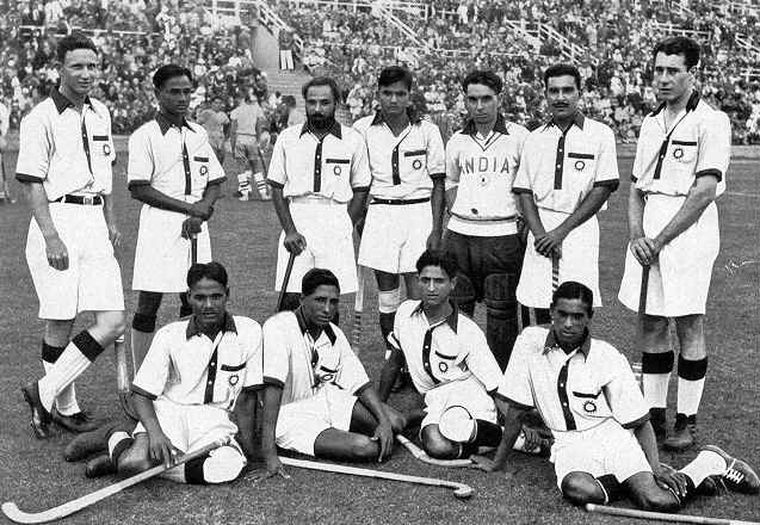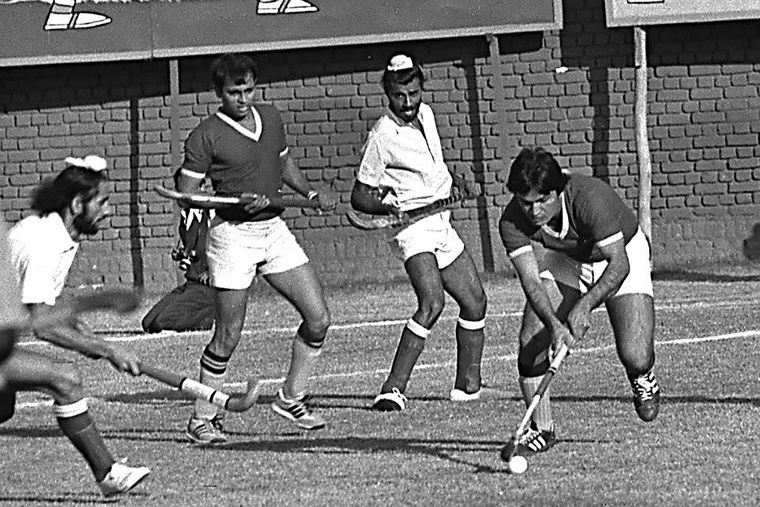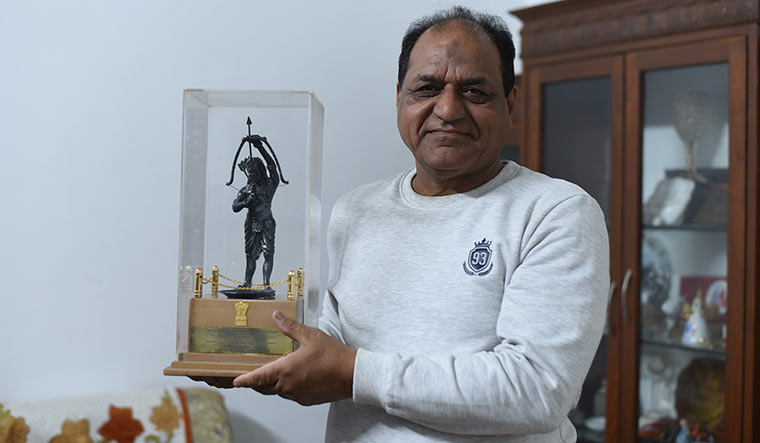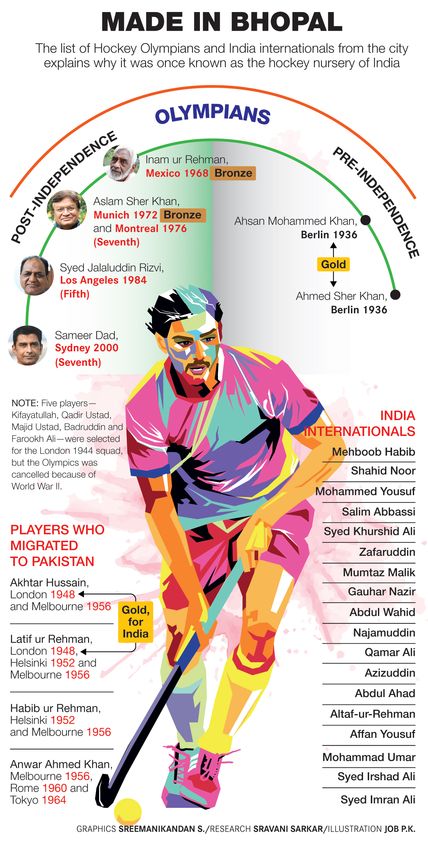The elderly gentleman has sharp eyes and an easy smile. Soaking up the morning sun in his lovingly curated little garden, he recites a Ghalib couplet in typical Bhopali accent: “Go haath ko jumbish nahi, aankhon mei toh dum hai; rehne do abhi saghar-o-mina mere aage (Even if my hands lack motion, there is power in my eyes; let the glass and goblet remain in front of me).”
That is Olympian hockey player Inam ur Rehman explaining why he keeps golf balls and a club in his drawing room. “When I am unable to sleep at night, I putt the golf balls one by one into an imaginary hole across the drawing room till I feel satisfied enough to get back to bed,” says the 77-year-old. “I do not have the strength to play hockey now, but golf gives me that much-required satisfaction of moving a ball deftly with a stick—that is the meaning of Ghalib’s famous couplet for me. It is difficult to imagine life without hockey.”
About 12km from Rehman’s house, at the historic Aishbagh Stadium in Bhopal, 13-year-old Afraz Rasool watches intently as another Olympian, Sameer Dad, gives tips to the trainees at his informal academy. “I practise here regularly,” says Rasool. “Sameer sir and Shadab sir (Railways hockey player Shadab Khan) coach us well. I, too, want to play in the Olympics like Sameer sir when I grow up and ensure that Bhopal’s name shines again in international hockey.” Dad was a regular at his informal academy till he was recently appointed as coach of the MP State Men's Hockey Academy.
The line-up from the passionate veteran to the starry-eyed teenager confirms that Bhopal is still devoted to hockey. Once known as the hockey nursery of India, Bhopal has produced 10 Olympian hockey players (see infographics) and the iconic Bhopal Wanderers team. The locals first tasted the game around 120 years ago, when some youngsters picked it up from British officials.
In an Urdu article published in 1996, former joint secretary of Bhopal Hockey Association (BHA) M.T. Ansari (who migrated to Pakistan after the partition) says that as hockey sticks were expensive, the youth used branches bent at one end—locally called khapota. Balls were made of twine-wrapped stones; the more enterprising players shaped balls out of date palm roots. With their pyjamas rolled up to the knees, they played in the narrow lanes, lined with open drains. The drains were a crucial feature; the players had to develop excellent ball control and dribbling skills to keep the ball from rolling into the drains.
Slowly, Bhopal become renowned for its skilful and artistic hockey players. Maulana Mohammad Ahmad, one of the pioneering players, encouraged local youth to embrace the sport and came to be known as baba-e-hockey.
Competitive hockey started in 1909, when the British organised an interstate forces tournament. When Nawab Hamidullah Khan joined Aligarh Muslim University (AMU) in 1911, he made the university hockey team quite easily, and word about Bhopal’s gifted players started to spread. Soon, hockey clubs were born in Bhopal; by 1915, there were around 15, including the Sikandariya, Rashidiya, Alexandra and Bhopal Heroes. The Iqtedar Silver Cup tournament (1916 to 1921) gave exposure to the local talent.
In 1925, Bhopal became a founder member of the Indian Hockey Federation (IHF); a Bhopal state team started playing national tournaments in 1928. The royal family formally constituted the BHA in 1931 (affiliated to the IHF) with Hamidullah as patron-in-chief and his nephews Saeed uz Zafar Khan and Rashid uz Zafar Khan as patrons.
“The royal family patronised the game with active participation, jobs in the royal army to talented players, provisions of nutritious diets, including fruits and dry fruit shakes, and transportation of players during the weekly local matches,” says Olympian hockey player Aslam Sher Khan. They also started the national-level Obaidullah Khan Gold Cup in 1931, giving Bhopali players and enthusiasts exposure to national and international players.
Meanwhile, at the AMU, where many Bhopalis were studying, the university team was not allowed to play in the 1931 Mathura Gold Cup because of upcoming exams. So the students formed another team. As eight players were from Bhopal, they named it the Bhopal Wanderers. The unknown team won the tournament. It was a sign of things to come.
In its first four years, the team won 10 prestigious tournaments across the country, and along the way it was reconstituted into Bhopal’s official state team. Two players from the side—Ahsan Mohammed Khan and Ahmed Sher Khan (Aslam’s father)—struck gold at Berlin 1936, under the captaincy of the legendary Major Dhyan Chand. The legend reportedly said, “Give me the Bhopal Wanderers and I can beat any team in the world.” From 1931 to 1950, the team won 30 tournaments in India and, according to Aslam, in 1938, it won all major tournaments.
The partition left behind raw wounds and it also affected sports. The first hockey nationals after the partition was held in 1948. It saw hockey powerhouse Punjab fielding a significantly weakened team because of the migration of players to Pakistan. Bhopal, which had first won the nationals in 1945, was not as badly affected, yet. It won in 1948 and two Bhopalis—Akhtar Hussain and Latif ur Rehman—were selected for London 1948, where India won gold. But, both Hussain and Rehman later migrated to Pakistan and played for the national team. This was seen as a betrayal and would have an impact on Bhopal hockey, years later.
Bhopal merged into the Indian Union in June 1949. The Bhopal Wanderers were disbanded the very next year, after key players migrated to Pakistan. The migration continued till about 1952. Bhopal hockey hit its nadir because of this exodus, says Aslam. “However, the first chief minister of Bhopal, Shankar Dayal Sharma, commissioned my father, Olympian Ahmed Sher Khan, as the official coach and asked him to revive hockey at school level,” he says. Ahmed, supported by another Olympian, Roop Singh (Dhyan Chand’s brother), went about the task and things started picking up.
In 1955, the Bhopal school level team, coached by Ahmed, participated in the nationals and won. After the reconstitution of states, the Madhya Pradesh school level team (also coached by Ahmed) won in 1956. By the early 1960s, Bhopal hockey peaked to such a level that at least 40 to 50 Bhopalis were playing for clubs across India, primarily the three big Kolkata clubs—East Bengal, Mohun Bagan and Mohammedan Sporting.
“Often, all teams at national level tournaments would have players from Bhopal,” says Rehman, who turned out for East Bengal and Mohun Bagan in the 1960s. Bhopalis were in majority in the first Indian Airlines squad, which went on to receive much acclaim in the 1970s. All post-independence Olympians from Bhopal—Rehman, Aslam, Syed Jalaluddin Rizvi and Dad—were Indian Airlines players. Dad also worked for the company, now Air India, as a senior assistant general manager till his deputation to the MP Men's Hockey Academy recently.
Until the 1980s, the city had around 70 clubs, in addition to teams of government departments and public sector undertakings. This machinery continued to polish the abundant local talent in Bhopal. But soon, the clubs started closing down and government departments stopped patronising teams, sounding the death knell for hockey in the city, says Rizvi. In the last two decades, Bhopal has produced barely a handful of India internationals. The last Olympian was Dad (Sydney 2000). But, there have been flashes of brilliance from players like the cousins Affan Yousuf (gold, Asian Champions Trophy, 2016) and Mohammad Umar (gold, Junior Men’s Asia Cup, 2015). The only current India player from Bhopal is junior women’s team goalkeeper Khusboo Khan.
So, what ailed Bhopal hockey? The issues were many—from losing royal patronage and facing alleged bias, to getting mired in the politics of hockey management, and the inability to adapt to the changes in hockey. Rehman, Aslam and Rizvi say that because Bhopali players had migrated to Pakistan and done well for its team, there was a bias. Even if Bhopalis figured in the squad, they would not be fielded. Aslam was the first Indian Muslim to play against Pakistan; he did that in the 1975 World Cup, which India won. He went on to captain India in the Qaid-e-Azam trophy in Pakistan in 1976.
Punjab, which saw Bhopal as competition, had a dominant presence in hockey management and this, too, made things difficult for Bhopalis, the Olympians feel. They add that Bhopalis had always banked on skill, but lacked stamina and endurance. Rehman says that as hockey became a power game on AstroTurfs and rules changed (such as the abolishing of the offside rule), Asians, and within India, Bhopalis, started floundering.
“Europeans used their majority in the international federation to change the rules and techniques, because otherwise, they could not beat the skill of teams from the subcontinent,” says Rehman. He also points out that hockey has become an expensive game now and much of the Bhopali talent comes from economically backward families.
The Madhya Pradesh government took major steps to revive hockey in the state by opening the Women’s Hockey Academy in Gwalior in 2006 and the Men’s Hockey Academy in Bhopal in 2007. It also funded AstroTurfs, set up feeder centres to scout for the academies and provided infrastructural and coaching support. However, Bhopal did not seem to benefit much. The academies produced India internationals, especially for the women’s team, but few were from Bhopal or even Madhya Pradesh. The talented youngsters scouted from other states benefited the most. Has Bhopali talent then dried up over the years? “Bhopal hockey was destroyed by its own people,” says senior sports writer Ramkrishna Yaduwanshi. “There was intense factionalism and politics in the BHA for years.”
Even the prestigious Obaidullah Khan Gold Cup started facing major hiccups at the turn of the century, and after an attempted revival in 2010, was finally discontinued in 2014. In January 2020, the BHA lost its recognition as a state-level body because there were two other associations in Madhya Pradesh affiliated to Hockey India (which replaced the IHF in 2009). Under the ‘one state one unit’ rule, the Jabalpur-based Hockey Madhya Pradesh, which started many years after the BHA, became the affiliated body from MP. The other body to lose affiliation was Hockey Madhya Bharat, Gwalior.
Rizvi, who is secretary general of BHA, says: “We petitioned Hockey India to continue our affiliation, but to no avail. Now, Hockey Madhya Pradesh has been asked to coordinate with Bhopal and Gwalior. But, the recent meeting was a disaster, because of the unprofessional attitude of the Jabalpur unit. But, we will continue to work and fight for the revival of hockey in Madhya Pradesh and in Bhopal.” He adds that creating jobs for hockey players by reviving government department teams and reviving clubs could go a long way. In January, the state home department decided to recruit national and international level sportspersons to 60 posts in the police every year (sub-inspector and constable level).
Though revival of Bhopal hockey does not seem easy, Dad is intent on doing all he can. His informal academy at Aishbagh Stadium pulls in interested young players from across the city. Youngsters who fail to get into or continue at the Sports Authority of India institute or the state hockey academies, also seek out his classes. “If only we can find some financiers who could take care of the kits and diets of these children, I am certain a lot of them will do very well and once they perform, we will be able to push them into the national and international level,” Dad told THE WEEK earlier.
Now, as the coach of the MP Men's Hockey Academy, Dad's expertise and passion is likely to help the young aspirants in Madhya Pradesh and Bhopal to realise their big hockey dreams.






